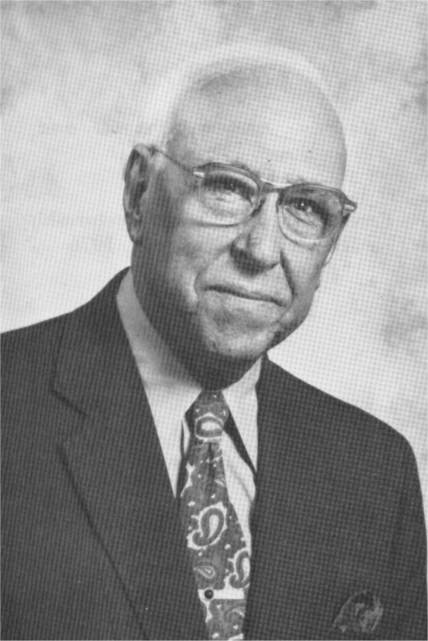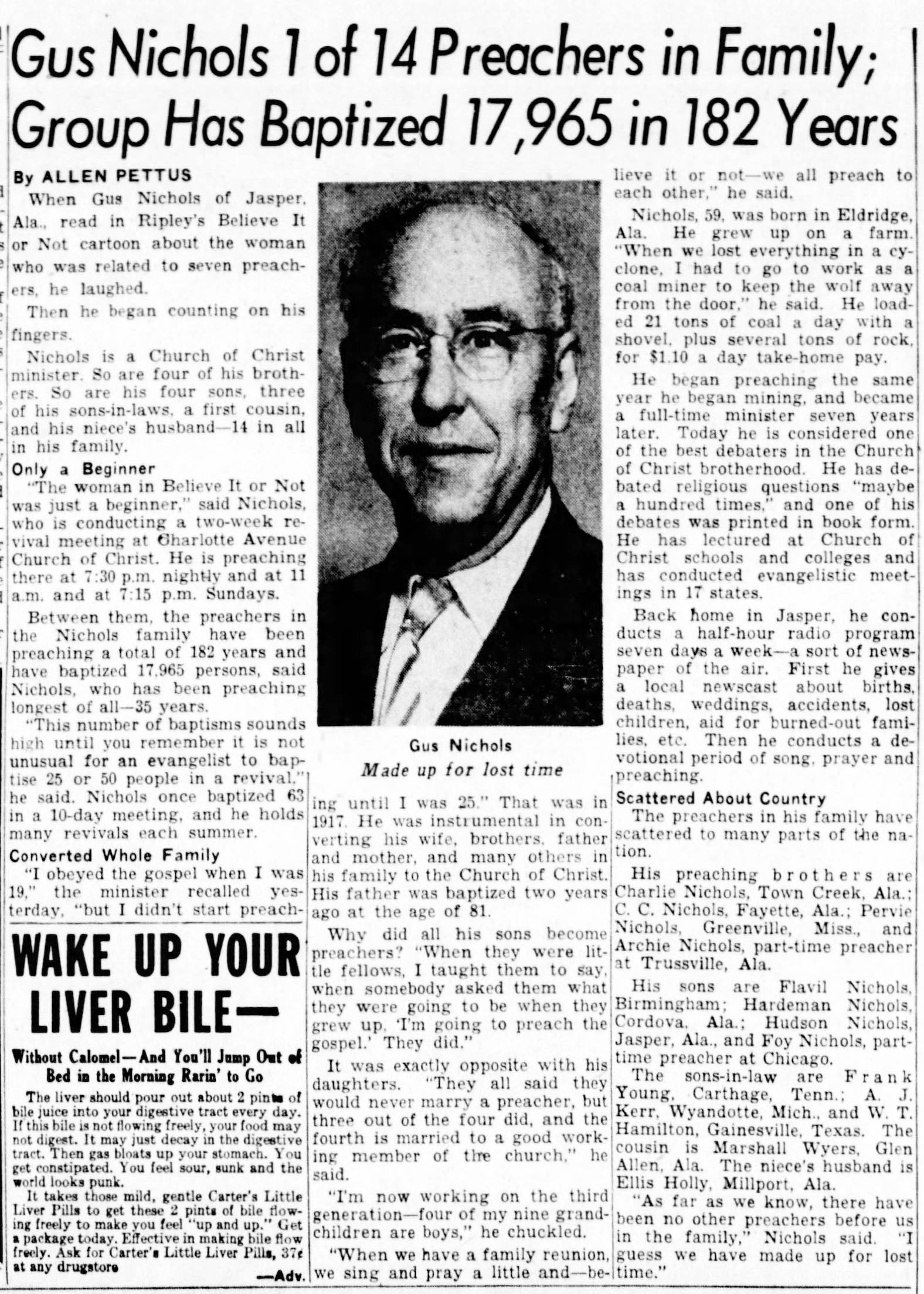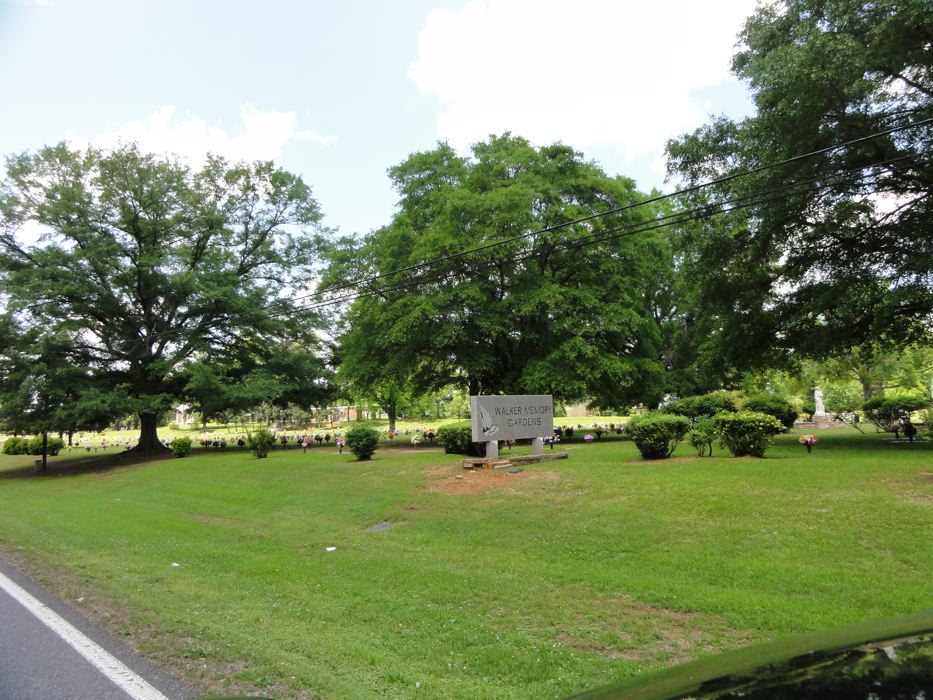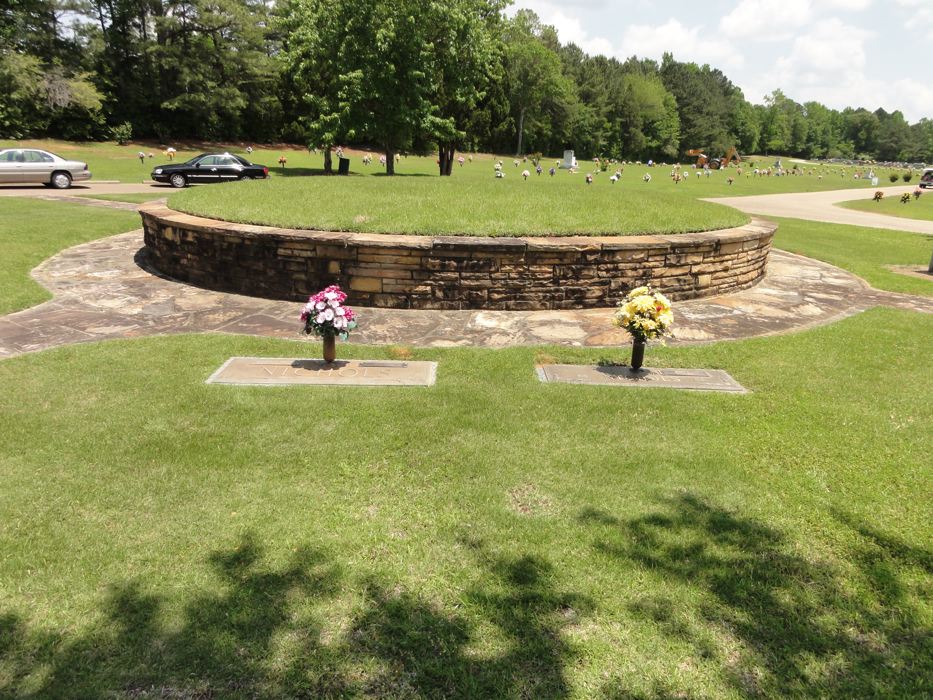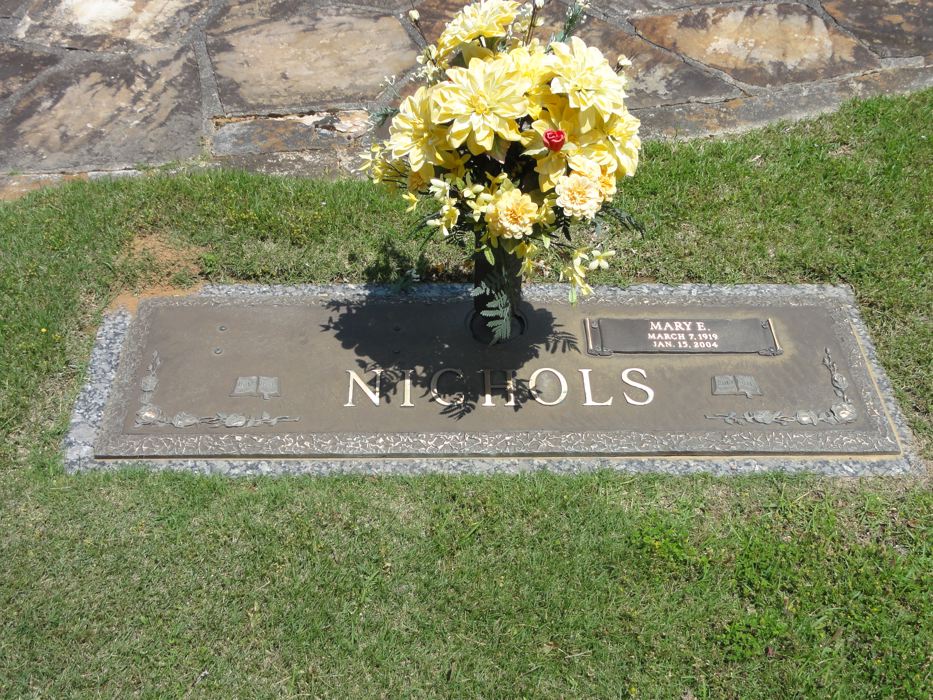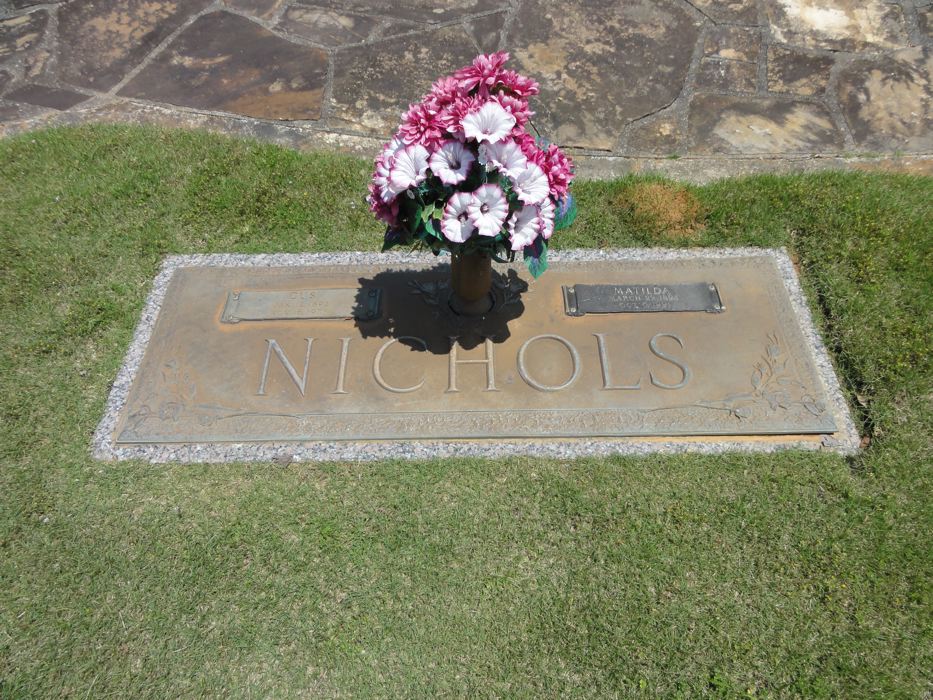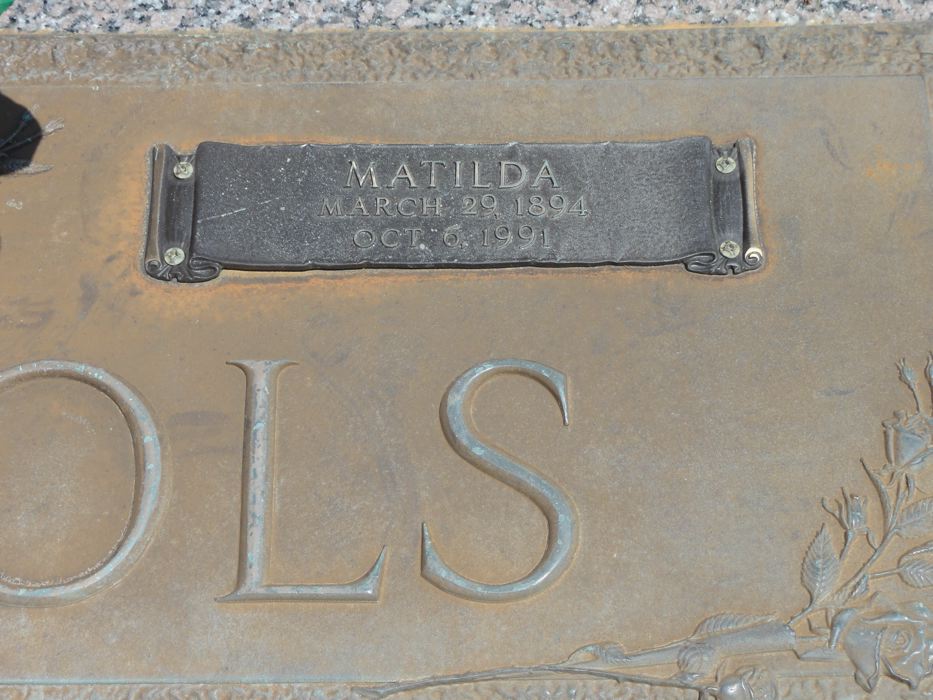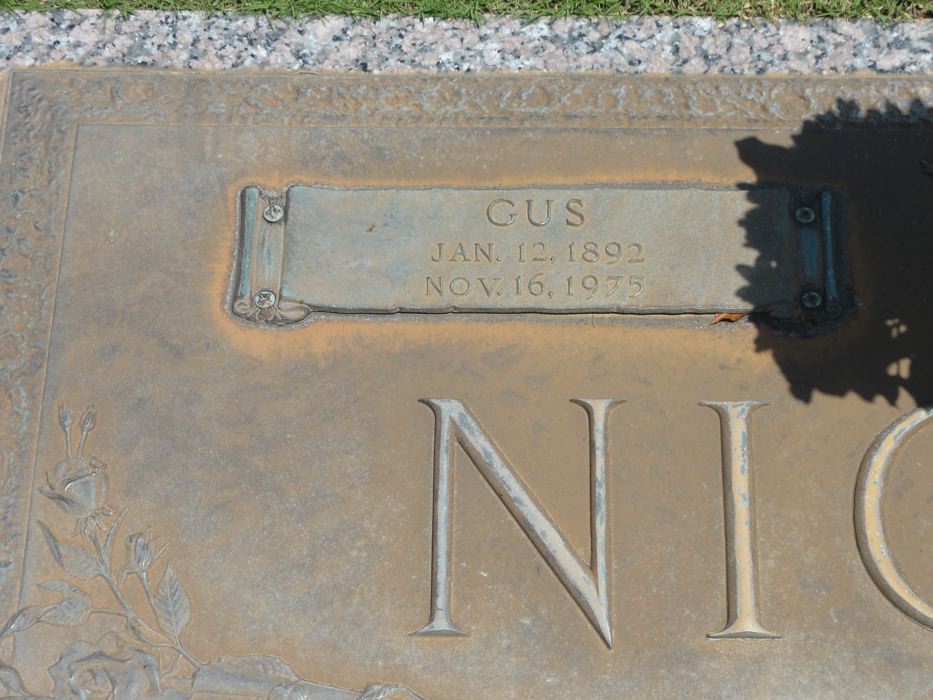New Biography Available
![]()
The Sage Of Jasper
Gus Nichols - A Biography
Available in pdf format (readable on Kindle)
Hardback - Available / 550 plus pages with many photographs
Purchase Here!
![]()
Bunion Augustus "Gus" Nichols
1892-1975
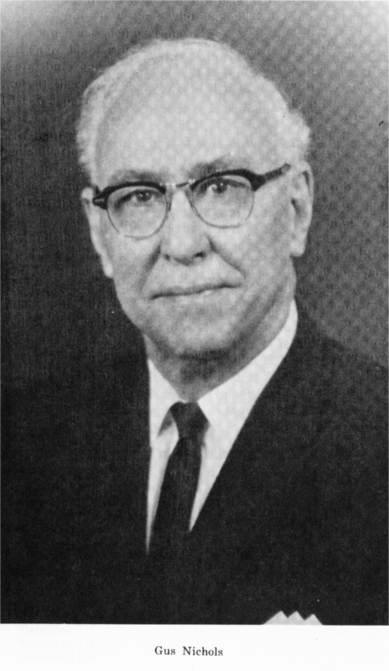
Biographical Sketch, Woodson
Obituary
Gus Nichols As I Knew Him, Turner
The Power of One
Honor Thy Parents
GA Cover
Audio Sermons & Debates
Stately Preacher, Picture
The Gallatin-Nashville Discussion
Directions To Grave
GPS & Grave Picture
Synopsis of Gus Nichols' book, Lectures On The Holy Spirit, Harp
Gus Nichols' Position Concerning The Holy Spirit - Faulkner Lectures 2017, Harp
![]()
Biographical Sketch of the life of Gus Nichols
Gus Nichols has spoken on each Freed-Hardeman Lectureship since the beginning of this series forty years ago. Each year hundreds of brethren have gathered to hear his scriptural lessons and to benefit from his comments in the Open Forum. In view of his many contributions to the cause of Christ through our annual lectureship, as well as through so many other avenues of service, it is most appropriate and very well deserved that the Lectureship and the Lectureship book of 1976 should be dedicated to this great servant of God.
Gus Nichols was born in Walker County, Alabama, on January 12, 1892. He was the oldest of ten children in the William Calvin Nichols family. The family, at first, were members of a nearby Baptist church. Gus Nichols learned something about baptism for remission of sins from a relative, Larkin Wyers, but at the time of his baptism into the Baptist church was dissuaded by the preacher from receiving baptism in the scriptural way. While a member of the Baptist church he taught singing schools at various places, among which was the Iron Mountain School near his home.
In August 1909 a gospel preacher, C. A. Wheeler, conducted a meeting at the Iron Mountain School. Because no one else was available and because of the high esteem in which he was held by the community Gus Nichols, while still a Baptist, was asked to lead the singing during the meeting. Brother C. A. Wheeler made a profound impact on the seventeen-year-old song leader. One sermon, "Walking by Faith," was especially impressive as Brother Nichols told me a few years ago. During the meeting he discussed the sermons with a young lady, Salina Brown, who predicted that he would become a "Campbellite." Nichols was surprised at this and stated that he had heard the Bible preached just as it was written in his own Bible. At the close of the meeting he and some others were baptized by C. A. Wheeler. He attended at White's Chapel, New River, and Carbon Hill churches of Christ. He also occasionally attended a nearby Baptist church with Matilda Brown, although the Baptists had withdrawn from him after his baptism. In 1912 he traveled to Herrin, Illinois, to attend school and work but he returned home in a few months.
On November 30, 1913, Gus Nichols and Matilda Brown were married. They began farming in the Howard Community near Carbon Hill, Alabama, at their home on the "Shaw place." Gus Nichols became active in the church which had been meeting at the Iron Mountain School. At this time Matilda Nichols was not a member of the church of Christ, but she attended with her husband. During a meeting conducted by John T. Lewis in Eldridge, Alabama, she learned her duty to God to become a Christian but she did not obey the gospel until the late summer of 1917 when she was baptized by C. A. Wheeler at the same site as where her husband had been baptized in 1909.
In May 1916 Gus Nichols began preaching at the Iron Mountain School. He farmed, worked at Galloway Coal Company in Carbon Hill, and preached for a time. He held his first meeting at Dogtown near Carbon Hill and stayed a night or two with the Oliver Keaton family of Carbon Hill, Alabama. He continued to farm and mine as well as preach. He would travel to Jasper, Alabama; go to the home of C. A. Wheeler, near Jasper; get books from Brother Wheeler; and return to the Shaw place to study them. On the night of May 27, 1917, a tornado blew away the Nichols's home. Gus Nichols was reading or had been reading Brents', The Gospel Plan of Salvation by the light of a kerosene lamp when the storm struck. He determined, with his wife's firm support, to become a full-time preacher after this incident.
Various preachers helped Gus Nichols in his studies. Along with Brother Wheeler, two men especially influenced him in his early years, Brethren Gaddys and Russell. Gaddys helped him greatly concerning the purpose of baptism; and Russell, who had studied under F. D. Srygley at Mars Hill, helped him concerning Holy Spirit baptism, instrumental music, and other controversial subjects.
In 1919 Gus Nichols moved his family to Berry, Alabama, to study under Hal P. McDonald at Alabama Christian College. Nichols studied the various college courses as well as Bible in the school. His family recalls his practicing typing with a metal cover over the keyboard, but they also observe that on occasion he could not resist "peeping" for a particularly stubborn letter. In 1920 a circular for the college listed him and his brother Charlie as being on opposite sides in a debate on giving the vote to women. Gus Nichols was in the negative.
In February 1924 Nichols moved to Cordova, Alabama, to preach. He remained there until the early days of 1926 when he moved to Millport, Alabama, where he remained until December 29, 1932, when he moved to Jasper.
The church of Christ in Jasper, Alabama, dates back to the efforts of several young men and women who had come to Jasper to attend Walker County High School in 1921 and 1922. Mrs. Will Gibson invited them to meet in her home. They met there and at the home of Brother Avery Fike for the rest of the year. In 1923 several members from Jasper were meeting at Cordova where Gus Nichols was preaching. They became interested in establishing a church in Jasper. On the first Sunday in October 1924 the Odd Fellows Hall, upstairs in the Phillips and Stanley Building, was rented and a gospel meeting began with Gus Nichols preaching. He had drawn arrows in the street, with chalk, to announce the meeting. The group met there for a time and then met in the courthouse through the courtesy of the sheriff, Farm Kilgore. They met in the courthouse for the rest of 1924 and continued there through 1926. In 1926 N. B. Hardeman held a tent meeting near the First National Bank, and thirty-seven people were baptized.
In 1926 a lot was purchased, a building was being erected, and the Fifth Avenue Church of Christ began meeting there. Brother C. A. Wheeler preached the first sermon in the then uncompleted building in 1927. When the building was completed, L. R. Wilson preached the first sermon in the morning and N. B. Hardeman preached the "dedication" sermon. The date was the first Sunday in October 1927. Brother Hardeman was remembered to have said: "If Jasper, Alabama, is ever saved, it will be through the church."
The church continued to grow. In 1933 Brother Gus Nichols came to Jasper to begin his work as a preacher. He continued until his death Sunday, November 16, 1975, at his residence. Many outstanding accomplishments were to be observed over the years. The Fifth Avenue, later Sixth Avenue, church of Christ desired Brother Nichols to succeed, made every effort to assure this success, and rejoiced with him when a victory was won. Many hearts and hands worked with him as he grew and increased in stature and influence.
Only a listing of a few accomplishments of this great church and this great man is possible. For forty-two years he conducted a training class on Friday night during the winter months. Hundreds of preachers and elders attended these sessions. Since November 2, 1946, a daily radio program was presented and it maintained a large listening audience. A program on another station was conducted for nineteen years. Gus Nichols contributed articles to the Gospel Advocate and served as the query editor for many years. He published articles in the local paper, The Mountain Eagle, which articles were later published in three splendid books of sermons. Other books of sermons were published later. Many lectureships, gospel meetings, and counseling sessions, along with regular preaching at Jasper and the usual responsibilities of a preacher, were attended and conducted by this very busy man. In all his activities he was easily approachable and seemed to find that extra bit of sparkle, which made one feel that Gus Nichols thought it was an honor to meet him. Other good deeds in behalf of orphans, Christian education, youth work, training sessions, resolving church problems, and rearing a family could easily be cited, but space forbids.
Gus Nichols sent his children to Freed-Hardeman College. He held the college in highest esteem as a sound and "model" school. His contributions to the school in lecturing, financial assistance, and counsel has been most significant. We mourn his passing, not for him but for our loss, we express our highest respect for his memory, and seek to recognize and demonstrate a desire to honor him and his family in dedicating this lectureship book to him.
--WILLIAM
WOODSON, Editor of Book, Biographical
Sketch from 1976 Lectures, Freed-Hardeman College, p.3-5
Addenda: Legacy and Heritage play an important role in anyone's life, especially one's spiritual roots. As this article portrays, Gus Nichols was baptized by C.A. Wheeler in 1909. Charley Wheeler came under the influence of J.H. Holbrook perhaps in the 1870s. Holbrook was baptized by E.A. Land in the mid-1850s. For Gus Nichols this represents a rich heritage in the Restoration Movement. See the article below where Flavil, the eldest son of Gus and Matilda demonstrate this legacy.
![]()
Editor's Note: Following is an article printed in the Daily Mountain Eagle, Jasper, Alabama - Brother Nichol's hometown newspaper - Tuesday, November 18, 1975, which indicates the high esteem in which he was held by those in his community.
Gus Nichols, a man of God who during his lifetime literally went from muleback to superjet with the gospel, is dead at the age of 83.
A lengthy illness caused him to meet his Maker Sunday, Nov. 16, in the home he shared with his beloved wife, Matilda Frances Nichols, across the street from the Sixth Avenue Church of Christ. He founded the church in 1924, serving as its minister for 43 years.
His body lay in state at the church until time of the funeral Wednesday at 2 p.m.
Interment was in the Fountain Garden in Walker Memory Gardens. Ministers of the Church of Christ conducting the service were B. C. Goodpasture, W. A. Black and William Woodson.
A vast brotherhood mourns his passing in addition to his family. Countless couples he married and with whom he counseled feel his loss. Thousands he has baptized are bereft. He was held in high esteem among his fellow-ministers, Walker County citizens and, indeed, throughout America.
Born in a log cabin near Carbon Hill, Gus Nichols had little formal educational until later years. At the age of 12, he had to drop out of school to help support the growing family. His father, William Calvin Nichols, "set him free" on his 20th birthday, and the next day he went back to school.
In his late 20's, with a wife and three children, he enrolled in Alabama Christian College, then located at Berry. Throughout his life he was a diligent student; he was an avid reader, accumulating a vast library.
In 1908, at the age of 17, Gus Nichols was baptized into Christ. He preached his first sermon in August, 1919, in a rural community schoolhouse. He supplemented his income by farming and working in a coal mine. He often spoke of the hard 12 hours of work at $1 a day.
The Nichols' home was the first one destroyed by a tornado that swept through Carbon Hill May 27, 1917. Later, he and his wife thanked God for that storm, for it had taught them not to trust in themselves, but to depend on God, who had "promised to make all things work together for good for his faithful children." (Rom. 8:28) Subsequently he prayerfully resolved to preach fulltime. With his wife's encouragement - "Don't make a two-by-four preacher, but be a good one - the best you are capable of being," he went on to do just that.
He went by mule back, by wagon with his family beside him, by car, by train, and then by jet from coast to coast as well as overseas to preach the gospel.
In his later years, he received many honors due to his writings, recordings, lectures on college campuses and schools and evangelical campaigns.
Freed-Hardeman College awarded him its 1975 award for outstanding contribution to its lectureships. He was awarded two doctor of law degrees (honorary), one by Magic Valley Christian College, Albion, Idaho (1964); and the other by Oklahoma Christian College, (1969). In 1971 and 1974 he was listed in "Personalities of the South," honoring American leaders. He is listed in the 1972 edition of "Who's Who in Alabama," and was twice commissioned an honorary lieutenant colonel aide-de-camp on the staff of Alabama Gov. George Wallace.
Pepperdine University at Los Angeles, Calif., awarded him its Christian Service Award for 1973. He received the Distinguished Service Award from Oklahoma Christian College in 1974, and a Distinguished Service Certificate in 1971 for his annual service to Blue Ridge Encampment. In 1969 Alabama Christian College at Montgomery, (on whose Board of Trustees he has served since 1958) honored him by naming its modern library "The Gus Nichols Library and Learning Center." In 1972 a library - was named in his honor on the campus of Bethel Christian School, Anakapalle, India. A cottage for children at Childhaven, Cullman bears Gus Nichols' name in honor of his service as a member of the board of trustees since it began in 1949. A plaque was awarded for his encouragement and other contributions toward the development of Indian Creek Youth Camp near Jasper.
Many of his sermons, lectures, debates, even poetry, have been published or are on cassette tapes. Two television films featuring him on "Herald of Truth" were seen nationwide and are now in several checkout libraries. One is a filmed service of the Sixth Avenue Church of Christ as he preached and the other entitled "The Gus Nichols Story," depicts biographical events of his life.
The minister never sought controversy, yet he never hesitated to contrast what he believed to be the truth with error. He felt "That the more truth is 'rubbed,' the brighter it shines."
He proclaimed the truth as he saw it on his daily radio program each morning beginning in 1946, although in the last few weeks others have taken up the task for his church. He made this program a most popular one in Walker County by announcing illnesses, deaths, births and items of general interest to his "neighbors." For many years he wrote a column for the Mountain Eagle.
In addition to Jasper, he served congregations in Millport, Berry and Cordova, as well as small rural communities.
The work of Gus Nichols lives on in the work of others he has influenced. Three of his sons became fulltime ministers, and the fourth preaches part-time; three of his daughters married fulltime ministers, the other a Christian businessman; four of his brothers became preachers and one grandson is a fulltime minister. Among his relatives (including in-laws) at least 20 became preachers of the gospel. For 42 years he conducted annual training classes from which have gone countless church leaders. Several dozens of men are now fulltime ministers due to his direct influence in their decisions.
Survivors include his wife of 62 years, Matilda Frances (Brown) Nichols, and their eight children: Mrs., Frank D. (Gracie) Young, Memphis, Tenn.; Mrs. A.. J. (Vodie) Kerr, Decatur, Ill.; Flavil H. Nichols, Sumiton, Mrs. G. Rile (Bertha) Blackwood, Jasper, Mrs. W. T. (Carrie) Hamilton, Waxahachie, Tex.; Foy W. Nichols, Indianapolis, Ind.; Hardeman Nichols, Fort Worth, Tex.; and Hudson Nichols, Gastonia, N.C.; 16 grandchildren, six great-grandchildren; two sisters, Mrs. Will (Zella) Windham, and Mrs. Paul R. (Hazy) Dozier, both of Jasper; three brothers, Archie Nichols, Birmingham, ham. Pervie Nichols, Jackson. Miss., and Titus Nichols, Fayette.
Grandsons were pallbearers.
-From Alabama Christian Reporter, VOL.21 No. 5, December, 1975, Quoting from the Daily Alabama Eagle, Jasper, Alabama, November 18, 1975 Back To Top![]()
Gus Nichols As I Knew Him
by Rex A. Turner
(The letter that follows is self-explanatory)
Mr. William Woodson
Freed-Hardeman College
Henderson, Tennessee 38340
Dear Brother Woodson:
Greetings and best wishes!
I am very glad to know that your institution is dedicating the Freed-Hardeman College lectureship book to Brother Gus Nichols. If ever a man deserves such an honor, he does. Relative to your request for my impressions of Brother Nichols, when I first met him, his greatest contributions, and the lessons that I learned from him-I submit the following:
When I was a lad of twelve years of age Brother Charlie Nichols, a brother of Brother Gus Nichols, lived in our area and preached for the Antioch church for one Sunday each month. During that period of time, he arranged an all-day preaching service with dinner on the ground, and the speakers were Brother Gus Nichols and Brother W. A. Black. My impressions of the two men linger until this day. I remember Brother Gus Nichols as being dark complexioned, handsome, energetic, and with gold filled teeth in front. He was a marvel for all the people in the community. I did not see Brother Nichols again until the year 1932, the year that I had begun to preach. He came to the Pleasant Hill Church, near my home, for a gospel meeting. Our daughter Jackie had just been born, but I managed to attend all the services, nonetheless. One of the first sermons that I heard him preach in that meeting-perhaps the first-was on the subject of the Holy Spirit. My! what a sermon! I knew absolutely nothing about the subject, and I had wondered what was meant by the statement, "baptizing them into the name of the Father and of the Son and of the Holy Spirit." The Father I knew and the Son I knew, but the Holy Spirit I did not know. When his sermon was over, I knew essentially what I know today, and I have preached that sermon that I heard from him hundreds of times since.
I had completed one year at the University of Alabama when I began to preach. After I had preached a few sermons, the brethren said that I needed to get back in college. I never understood why or how they figured that out so soon. Anyway, the point is that after a six months stay at what is now Jacksonville State University-from January to June-I was back home for the summer, and I was preaching by appointments as I had opportunity. Brother Hood Florence, now deceased, said that I should go and study under Brother Gus Nichols, and so I caught a ride to Jasper, Alabama, and went to the Nichols' home, and rapped at the door. Brother Nichols happened to be in, and I announced that I had come to study under him-all of this without an invitation, mind you! Brother and Sister Nichols greeted me and extended their hospitality to me as if I had been their grandson whom they had not seen in a long time. The depression was on, and the Nichols had eight children at home-only eight, mind you! I have often wondered what my reaction would have been, and what I would have done, if I had been in their place. In justification for my imposition and blundering, I did try for thirty-one years to turn no person away from college who desired a Christian education, regardless of his financial circumstances.
This was Gus Nichols, and this was Sister Matilda Nichols. No person was ever treated more graciously when visiting in another home than was I while visiting in the Nichols' home.
With great patience, Brother Nichols taught me how to make sermon outlines, and he had me to read to him orally. He corrected me on my pronunciation, and he emphasized how I should modulate my voice from sentence to sentence. The next week, he went to the White House Church in Marion County for a gospel meeting. He carried me along, and he arranged for me to teach a young people's class each evening just prior to the service. He later told me that the first promise that he saw in me as a gospel preacher was when I began teaching the class. He presented me with some back issues of the Gospel Advocate to read, and he stated that every preacher should be a subscriber to that paper.
From this beginning, I was an understudy of Brother Nichols for a number of years. He counseled me relative to books that I should buy, relative to areas of judgment, and the like. A few years later when I had been up and down the country places and little towns preaching the gospel and challenging sectarians for debate, I eventually had a man to accept the challenge-a Primitive Baptist preacher. The propositions that I signed were all afield-in short, I knew absolutely nothing about Calvinistic doctrine. Quite naturally, I moved in on Brother Gus Nichols to prepare for the debate. With utmost kindness, he pointed out how the propositions could have been worded much better. He prepared for me material that would move into a proper course for the meeting of Calvinistic doctrine. We prepared charts-at least he did, while I stood by or sat by. I have a raft of those charts even today. As circumstances will often have it, at the last moment the Primitive Baptist preacher backed down. The brethren of the Grassy Church near Arab, turned the debate into a gospel meeting, and I debated the issues, using my materials and charts without an opponent to reply. The brethren thought that I proved myself to he a good debater.
Brother Nichols was about forty-two years of age when I first studied under him. He had just moved from Millport to Jasper, Alabama-from a small town church to a city church. When I was expressing to him my appreciation for his vast knowledge, I commented that my observation was that he was one of the best informed men in the brotherhood. The satire of my statement was that I could count all the preachers I knew on two hands, or less. Anyway, the point is that Brother Nichols observed that he had been invited to the North Birmingham church, which incidentally was only about forty miles away, for a meeting. I mention this to show that at that time Brother Nichols' worth and ability was not known to the brotherhood. After a few meetings in the larger cities and an appearance or so on the lecture programs of our Christian College-particularly on the Freed-Hardeman College lecture program-Brother Nichols' rise of influence and use was swift and far reaching.
Rarely ever does a man of humble origin, as was the case with Brother Nichols, touch the lives of so many people. He was a man of good intellect, but his vast knowledge did not come about as a result of his having genius proportions-rather through long consistent hours of study, prayer, and dedication. He was fortunate to have Matilda Nichols as a wife, and a good wife she was! With unusual calmness she birthed eight children and cared for them. She washed and scrubbed and cooked, and there were visitors at her table at one meal or another almost every day. She planned her work so that when Brother Nichols returned from meetings she could give her time to him. In those days there were no Women's Lib movements; but had there been, she would not have been a member. She gave her life to her family and her husband. Without her, Brother Nichols could not have been the great man that he was.
Brother Nichols was to the church what the good general practitioner is to a community. Though he was one of the most competent debaters of the brotherhood, he did not specialize in debating. He was not a specialist in any particular field of religion. He was, instead, quite competent in all fields of study, and he developed the tools with which to do indepth study when the circumstances demanded. He was a preachers' preacher and churches from North to South and from East to West have profited by his preparation and dedication. Within this frame of reference, the Oklahoma Christian College conferred an honorary doctorate degree upon him.
As for the lessons that I have gained from Brother Nichols' life, the lessons have been general and touch on every facet of Christian life. I was particularly impressed by his hospitality, by his magnanimous spirit, by his dedication, and by his sacrifice. He did not seek to store up treasures here on earth, nor has he had the resources with which to do so, for that matter. He passed on to me one lesson that he learned from an older preacher Brother Srygley-I believe he said-and that lesson is this: On every Bible subject, and particularly the more difficult ones, a person should read all the Bible has to say on that particular subject "When You do this," he said. "the answer to the problem will in almost every instance, spring forth."
Brother Woodson. I have written in this fashion, thinking that by such an approach you can the more nearly appreciate Brother and Sister Nichols in the light in which I have known them.
With kindest personal
regards, I am
Fraternally yours,
Rex A. Turner
-Sound Doctrine, Volume 1 No. 4, November/December, 1975, pages 2,14
![]()
During the War Between the States, a young woman learned the truth and obeyed the gospel. Her sweetheart, J.H. Halbrook, was a confederate soldier. He was captured by the union army and kept a prisoner in Michigan until the war was over. He was given a ticket to Nashville, TN and $2.50. From there, he returned to Centerville and found what was left of his home and family. He found his girlfriend and they were married. His wife studied the Bible with him, and he soon became a Christian. He thought the truth was so good and so simple that he began to teach and baptize many of his friends and neighbors. He began to preach, but he recognized his need for more training, so he came to the original Mars Hill Bible School, taught by T.B. Larimore. Upon completing his studies there, instead of going back to Tennessee, they moved farther south, coming into Walker, Marion, Fayette, and Lamar counties in Alabama. One of his many converts was Charley Alexander Wheeler. His wife taught him to read from the Bible. Along with his wife, C.A. Wheeler obeyed the gospel and soon began preaching to others. He started more than 100 congregations and baptized more than 6,000 people. But wait, the story is not ended! One of those 6,000 was my father, the late Gus Nichols. Twelve thousand were baptized under his preaching. Among those baptized by Gus Nichols, no one knows, nor can know, how many began to preach "the glorious gospel of Christ" (2 Cor. 4:3,4); but I personally know several. I, Flavil Nichols, am ONE whom he baptized and whom he encouraged to preach the truth. And under my preaching, about three thousand have been baptized. A few among them preached the gospel also!
Only eternity can reveal the total results of the conversion of that one girl nearly one hundred and fifty years ago. The results are not yet all in! But this shows that TWENTY-ONE THOUSAND people have become Christians through this single thread in the fabric of her influence.
"Go, and do likewise" (Luke 10:37). YOU are important, too! Dear reader, if you go to heaven, others probably will be saved by you! "For what knowest thou, O wife, whether thou shalt save thy husband? Or how knowest thou, O man, whether thou shalt save thy wife" (1 Cor. 7:16)? "Let you light so shine before men, that they may see you good works, and glorify your Father which is in heaven" (Matt. 5:16). Each ONE is very important.
-Flavil Nichols Huntsville, AL
-From
The Winfield Newsletter, Vol. 21, No. 14
HONOR THY PARENTS
SOME THINGS I LEARNED FROM MY FATHER,
THE LATE GUS NICHOLS
Through the kind providence of God I was born into the family of Gus and Matilda Nichols. I am sure I did not realize how richly blessed I am. To me, they were simply my Mother and Daddy. My very earliest recollection of Dad was when he playfully "raced" with me from the barn gate to the wagon, where he jumped over the wagon tongue—and I ran under it! He played "Hide-'N-Seek" with us, as well as baseball and other games. He taught me to make a whistle from a hickory limb, loosening the bark when the sap rises in the spring. When I broke the blade in my pocket-knife, he taught me to use things for the purpose they were intended: a knife blade was not designed to be a screw-driver! From a small tree he showed me how to saw "wheels" for a toy wagon. With a mirror he showed me how to "bend" the afternoon sun's rays so they shined into the bottom of our well. He helped me learn to read, and write, and to memorize the multiplication tables.
But here are some far more important lessons I learned from him."LOVE FOR GOD AND HIS WORD
Dad joined the Baptist denomination when he was 16, but before he married he heard "the glorious gospel of Christ" (2 Cor. 4:3) in its ancient simplicity, purity, and power. He did not just take the preacher's word: he made notes, and "searched the scriptures daily, whether those things were so" (Acts 17:ll). His love of God and his desire to follow the revealed will of God led him to give up denominationalism, and to become simply a New Testament Christian.
While plowing he would stop his mule at the end of a row, take from the bib pocket of his overalls a New Testament, and read carefully a verse he wanted to memorize. Then as he plowed another row, he would quote that verse aloud repeatedly. Upon mastering it, he would do the same with the next verse. In this manner he memorized many entire chapters. Dad also made a list of passages for each child to memorize. Before meals each was required to recite a Bible verse, and tell where it is found. Our morning devotions began with a reading of scripture, during which due attention was required. He thus instilled in our hearts a reverence for the Bible and familiarity with it. He borrowed books in a suitcase from brother C. A. Wheeler, the preacher who had converted him. Too poor to buy kerosene for the lamp, after working all day he would lie on a quilt before the open fireplace after supper, and by the light of burning pine-knots, he would read aloud to mother as she sewed, or churned, or quilted. His eyes would become red and blood-shot; but instead of quitting, he covered one eye, forcing it to rest, while he read with the other eye—alternately resting his right eye, and then his left! But he kept on reading! By his life and example he taught his family to love God and his word. His hunger for truth led to his first poem, which began: Give me truth! It I will do! For in John eight verse thlrty-two. Our Savior said as you may see, It is the truth that maketh free.His quest for truth was life-long. Even after he was past 80, if he waked during the night and thought he would be awake about 15 minutes, he would read 10 or 12 of those minutes and maybe for two hours! He read more books each year than many preachers do in five, or maybe ten! In 1973 he asked me to work with him as he prepared for his debate with Max King. For six weeks we put in 14-to-16-to-18 hours a day! And sometimes he worked three or four hours after I went to bed! He then was 81 years old, but his physical stamina amazed me.
His reverence for the word of God manifested itself in his encouragement of other preachers. He especially encouraged young preachers, both verbally, and by giving them sermon outlines, tracts, books, etc. He also would drive even long distances to hear them preach. Hugo McCord told me last year that Dad encouraged him by driving thirty to fifty miles to hear him soon after he graduated from Freed-Hardeman College. Dad was one of the best listeners I ever preached to (and I learned from him nearly everything I know!) At David Lipscomb's Lectureship in 1937 Dad sat with about 50 others on the stage facing the audience in old Harding Hall. I clearly recall how he watched every gesture and move the speaker made. Hanging on every word as if he had never heard it before. While he sat there with his mouth open—to "drink in every truth—other preachers who (in my prejudiced opinion) were far less knowledgeable, sat there inattentive, and listless, and some even went to sleep. He taught true reverence for God and His eternal word.MARRIAGE IS SACRED
Dad and Mother loved each other and were faithful to their marriage vows. They both believed God joins husband and wife together in marriage for life (Mt. 19:3-9), and that its privileges are exclusive. Both Mother and Dad were totally committed to each other, celebrating almost 62 years together. Never was there even a rumor that either of them carried on any flirtatious "affair." By word and example they taught the sacredness of marriage.
While all eight of us children were together at the time of Dad's death, none of us could recall having ever seen, or heard, either of our parents do, or say, a single thing of which we were ashamed—neither then, nor later!DIGNITY OF LABOR
By their example, they taught us there is honor and dignity in hard work. They sometimes took us children to the field with them. A quilt at the edge of the field provided a "pallet" for the baby who was watched by the next youngest while the older ones were taught to work alongside our parents. We learned to chop cotton, thin corn, cut weeds, etc., and to harvest what was produced in the garden and fields. We picked cotton, gathered corn, and also picked blackberries. Each child was assigned various household chores, and was expected to do the work assigned.
He taught us that each child is important, and that parents need to spend "quality" time with each child. In my early years Dad was primarily a farmer who preached on Sundays by appointments in the area. During the winter months, and also in the summer after his crop was "laid by," he worked in a coal mine—for a dollar a day! After walking three miles to the mine entrance, he had to walk three more miles underground before his 12-hour shift began. He did not see us children awake from one Sunday till the next. In time, more and more invitations to preach took him away from his family all day even on Sundays, too; so he quit working in the coal mine. Mother told him that if he were going to be a preacher, she wanted him to be a "good one—not just a 2 x 4 preacher—promising that she would faithfully stand behind him. And she did!
THE GOLDEN RULE
Our parents expected us to be reasonable-at work or play. with family members or other people, indoors or outside. This one principle helped us to apply our Savior's Golden Rule (Mt. 7:12).
"BE THOU AN EXAMPLE"
We were expected to set a good example, not just because Dad was a preacher, but because he was a "Christian." When I was a first-grader, the son of a prosperous church leader gave me a "ready-rolled cigarette [not just "the makings" for a roll-your-own] on the school campus daring me to smoke it as I walked across the campus toward home. Someone who saw me phoned my father, who upon my arrival opened the front door for me. After what seemed like an hour's lecture about the evils of tobacco, and about my influence and example, 1 was properly punished. Years later I reminded him of this incident, stating that I had smoked at one end, but hc made me "burn" at the other. I thanked him for that whipping, for it may have prevented my becoming a nicotine addict, and by my example I may have influenced others also to not smoke.
"THOU SHALT NOT STEAL"
When he was about five, Gus Nichols returned from a visit to his grandparents (about three miles through the woods) with six new shiny "cut" nails in his pocket. His maternal grandfather was putting some new shingles on his roof and those were the first new nails he had ever seen. His mother made the lad walk back-alone-to return them, and to ask his grandfather's forgiveness for "stealing" them. He said he ran most of the way back home, because he wanted to get out of the forest before dark. But from that experience he learned honesty and to control his "wants." He never again had "sticky fingers" and taught us not to steal.
He also stressed the importance of living within our means. No one especially a preacher should spend one penny MORE than he makes. If an obligation can't be met when due, make arrangements with the creditor to pay it later. After living in Jasper for more than thirty years I heard him say (with tongue-in-cheek) that he would be "afraid to go to the bank and ask to borrow, on just his signature, $25,000—he was 'afraid' he would get it, and would have to pay it back.
LAY UP TREASURES IN HEAVEN
I have known few people who gave more generously to the church and other good works than my mother and father. He gave of his time and ability and influence to promote many worthy causes, serving on the Board of Trustees of Childhaven, Inc., and of Alabama Christian College (now Faulkner University). He promoted the circulation of The Gospel Advocate, of which he was a staff writer, winning every subscription contest they had until 1962.
When the church in Jasper erected a new building, instead of buying church bonds—which he promoted—he and Mother gave extra to the church. He said this would "stretch" church funds, for the church would not have to repay those dollars, nor pay interest on them.
Year after year he and Mother agreed not to buy each other Christmas gifts, but instead they gave to some good project the amount which would have been spent on gifts they could do without. The Internal Revenue Service audited his Income Tax Return one year, and they could not believe, until they saw the cancelled checks that a couple on such a small salary could give to the local congregation 28% of their net income. In addition they gave generously also to other good works. When he told my brother Hardeman that he was signing another five-year pledge to give $1000 a year to Alabama Christian College, Hardeman reminded him that he that year had already turned 80. He replied that when he was 75 he signed such a pledge; and how did he know but that God let him live those last five years just to pay it off? If he signed a new commitment, God may let him live five years more to pay it off. After he was 83, and was bedfast, he asked Mother for the check-book so he could write a check to Alabama Christian for another $1,000, although they already had sent their pledge for that year. He said that God had blessed them so much that he wanted to write the check for their next year's pledge. That was the last check he wrote before he died November 16, 1975.
I think there are at least five basic reasons for such generosity: (1) They knew God requires liberality. (2) They had unlimited faith in God's promise to reward those who give liberally. (3) They had undaunted faith in God's ability to keep his promises. (4) They were totally void of any inward selfishness, which is dangerous and damnable. (5) And he and Mother truly regarded everything they gave to the Lord's work as just another 'Deposit' in the 'Bank Of Heaven' that will abound to their "account" (Phil. 4:15).
POWER IN PRAYER
The first of 1933 Dad returned to the congregation he had established (in 1924) at Jasper. A building had been erected in 1927, and a few months after our return (it may have been two or three years), the mortgage company notified the church that it would accept $4,000 cash by a certain date as full payment for a balance of $7,000. A $3,000 gift offer! Our economy was recovering from the crash of '29, but many members were on public works programs. Many banks had failed, and the church had no established credit rating. No one in the church had reserve funds available. Dad preached two Sundays on prayer, and asked the elders and their wives to join him and mother in prayer every hour, daily, for two weeks—to pray fervently that God would lead them to a someone with $4,000 the church could borrow. After this period of prayer, on Monday morning before the deadline, Dad told Mother he did not intend to return home until he had found that needed loan. She remarked that he could not go very far, because she knew he did not have money to buy much gasoline. He replied that he was not going in the car, but on foot, and kissed her goodbye.
Walking toward the business district he passed one office where the black janitor was sweeping the sidewalk. The second man he saw that morning was a judge on the courthouse steps. Exchanging greetings, my father remarked that the judge seemed unusually happy that morning. Cheerfully he explained that he had a special reason to be happy—he had just paid off his $3,000 mortgage! Entering the courthouse together, he remarked that the agent did not like it because he had paid it off ahead of schedule, and the out-of-state lender had been depending on the interest it was earning. Inside his office, Dad stated that no doubt God had providentially led him to the judge that morning. Upon hearing his mission, by phone the judge made an appointment for Dad immediately, and he soon returned to report that the agent agreed to let the church borrow that $3,000. Now could the judge suggest a source for the other $1,000? A widow who lived in another town was employed in the courthouse, and had overheard at least part of their conversation. She spoke up and proposed that she would lend the church $1,000, if Dad would personally sign the note with the elders. Dad was back home well before noon with assurance of the needed funds for the church. He always believed that their prayers had availed with God.
Since we are not "heard for (our) much speaking," many of his prayers were short. Instead of talking so long to God, he spent far more time letting God speak to him through his written word. For 57 years he studied the Bible an average of five hours a day. Always his study was in a reverent atmosphere. Truly he wanted God's help as he endeavored to learn and to do, God's will. In addition to his "regular" prayers, often he would pray while waiting for a traffic light to change, asking God in Christ's name to bless this sick person, that particular preacher or elder, this work of the church, or that good effort.
FAITH IS PRECIOUS
The last time he was able to go to the table for a meal he asked Mother to invite brother and sister W. A. Black to come eat with us. After lunch we assisted him down the hall to his bedroom where he wanted brother Black and me to read to him. He asked us to read every passage we could think of that refers to heaven and the world to come. He said, "I'm going to heaven, and I love to anticipate it. Let's read and discuss what God has revealed about it." For more than two hours we read and talked about the wonderful home over there. He commented that many times when visiting those gravely ill, he had shied away from mentioning death and heaven. But now that he apparently could never be well again, he relished the thoughts of that heavenly home. He suggested that it is a great comfort for a Christian to have a preacher, or an elder, or some family member to give him reassurance. So in his later years, when visiting a faithful Christian, he would sometimes say, "Brother (or Sister) Blank, you have been saved by the grace of God, and have been faithful to Christ; you have Bible assurances of a home in glory." Then he would quote John 14:1-3, or some other appropriate text. With Paul (2 Cor. 5) we can "know" that there is a "house not made with hands" awaiting us. In the calm serenity of this firm conviction, a few weeks later he fell asleep, November 16, 1975.
What a marvelous legacy he left us! —Flavil Nichols, 1990 Freed-Hardeman Lectures, pages 190-196![]()
Back To Top
![]()
Debate With Albert Bates And Gus Nichols - 1967
Debate
On Holy Spirit Baptism (November 3, 1967 -
Debate between Gus Nichols And Albert Bates. Four 15 Minute speeches. Bates begins, GN rebuts, Bates continues, GN rebuts at the end,)
Debate On Instrumental Music
(November 4, 1967 - Debate between Gus Nichols And
Albert Bates. Proposition: "The Scriptures Authorize The Use Of Instrumental
Music In Worship Bates Affirms/Nichols Denies - Four 15 minute speeches.
![]()
The Gallatin-Nashville Discussion
The dates of 7-12 July, 1952 marks the occasion of a debate that was conducted between Frank M. Mullins (1901-1964) and Gus Nichols on the subject of Premillennialism. The first three nights took place in Gallatin, Tennessee in the High School Hall there, and the last three nights were held in Nashville, Tennessee in the building of the Charlotte Avenue church of Christ.
Fellowship Discussion - Mullins, Nichols, Nichols, then Mullins
![]()
Great Alabama Preacher In The 20th Century
![]()
Out Of My Memories
If you knew Gus Nichols, or had met him at any time, then you probably have a very special "Gus Nichols" story. Mine is most special to me. As a young and impressional teen, I venture to say that my "Gus Nichols" story helped make me who I am today. My family was living in Forest Park, Georgia at the time, where my father, Richard T. Harp, served as the regular preacher. We had Gus Nichols of Jasper, Alabama to conduct our summer meeting. I had heard of Gus Nichols all my life. I had been to Gospel Meetings and to Alabama Christian College Lectureship (now Faulkner University) to hear him preach. So, he was about as big a name in the church as I ever knew. What was so impacting about the week for me was that he stayed in our home. And, even better, my bedroom had two bunk beds, and so he was assigned to rest only a few feet from me each night.
On Sunday morning we prepared to go to worship, and just as I picked up my Bible to go out the door, he commented that he wanted to talk with me later about the Bible I was using. Not thinking too much about it, I replied that I would look forward to it. It was a busy day for all of us. This 82-year-old man spoke during the Bible Class period. Then, during the morning worship he preached for nearly two hours. Even at 14 years of age I was spellbound by his powerful preaching. He preached again in the afternoon, and later in the evening. Sunday night was a wonderful family time in our home with this great champion of the faith. We sat around, talking and visiting with him until 11pm. As we readied ourselves for bed, he said to me, "Scott, get your Bible and let's talk about it." Until that moment, I had forgotten the conversation we had early that morning, and was a little startled that after all the events of the day, he remembered wanting to talk with me about my Bible. So, for the next hour, we sat on the edge of our beds and studied the Word of God together. As the Bible I was using at the time was not a translation, but a paraphrase, he commenced to show me in a loving and gentle manner that a proper translation of the Scriptures should be preferred above the use of a paraphrase. We looked at passages all over the Bible, comparing the paraphrase to a proper translation. In the end, I was sold on the need to use good translations of the Scriptures.
So, as much as I received the blessing of hearing this man preach, I shall never forget the blessings of our conversations while he was in our home all those years ago. Brother Nichols died the following year, and we mourned his death as if we had lost a member of our own family, but then there were thousands of others who did the same. . . .As I write this, over 44 years later, I recall that somewhere in my personal things is a little used dispenser of hearing aid batteries. He left them on the table beside the bed where he slept—one of those little things I have held on to through the years.
After his death, I heard different stories from those who were with brother Nichols in his last days, especially from his son Flavil. One story I recall was when he was bedfast, he loved to have the Bible read to him. On one occasion a preacher came in and began reading the Scriptures, and Brother Nichols tried to get out of bed. Knowing he was unable to walk, he was encouraged to stay in bed. Flavil asked, "Daddy, why are you trying to get up?" As he was very weak, and every word a struggle to get out, his father said, "I've got. . .to go preach. . .the gospel."
Another incident related was during some of the last days, when brother Nichols was laying in bed and unable to communicate. He laid there without moving so much as a muscle. As preachers continued desiring to visit, the family, encouraged them that they should plan for brief visits, to either pray or read a brief Scripture. When one brother dropped by and began praying, the family was startled at some movement of the sheets that covered their father. They noticed his hands come together, almost instinctively, to a folding position. Though it was a surprise to the family to see him move his hands together on that occasion, anyone who knew brother Nichols knew that whenever he prayed, either publically or privately, he would always pray with hands folded in front of him. His were truly holy hands lifted before his God.
In July, 2001 my dad and I were over in North Alabama visiting my grandmother in our hometown of Haleyville. We went down to Jasper for the day to visit with Flavil and Mary Nichols. The oldest son of the late Gus and Matilda, Flavil proceeded to take us on a tour around Walker, Fayette and Marion counties to see the places where his father lived and worked. We had lunch with one of Flavil's cousins, and good friend, James Wyers, over in Winfield. The last stop of the day was at Jasper where we finished our day at the grave of Flavil's parents at Walker County Memorial Gardens, just north of town on Hwy. 5. This cemetery is the burial place for several Nichols family members, many of whom were preachers of the Gospel. In addition, a good number of preachers are buried there as well.
In front of the cemetery office is what use to be a working fountain, around which is the burial plot of Gus and Matilda Nichols. It was there that Flavil related some information that should be shared. Gus Nichols was about as well known in the community of Jasper and surrounding Walker County as he was known in the church. When he died he was awarded the first burial site in the Circle of Honor, a site that was constructed in the cemetery for the purpose of awarding to dignitaries and public officials who had devoted their lives to the people of Walker County, a place of honor to be buried. A plot in this section can not be purchased. For no less than 30 years after brother Nichol's death, no other dignitary of the county had been buried in the Circle of Honor. It is only in the last few years from this writing that someone else has been buried there other than Nichols relatives. Two other plots were awarded to the Nichols family. The children of the Nichols decided that the other two plots should be given to Flavil and and his wife Mary. Today, Flavil and Mary Nichols are buried there in the Circle of Honor next to his parents.
If traveling between Memphis and Birmingham, this is one gravesite not to be missed. The day of our visit with Flavil and Mary will stay with us until we pass from this life. Not only did we visit his parents' graves (pictures below), but they took us to a number of places around Walker County. We went down to brother C.A. Wheeler's grave near Midway church of Christ. We also travelled down to where the old Alabama Christian College existed where his father attended, near Berry, Alabama. We went over to the New River church where the Randolphs and a number of other preachers are buried. Then, we headed over through Hubbertville, where I had gone years before to hear Flavil preach in a gospel meeting. Then we went to the location where his grandparents, William C. and Velma E. Wyers Nichols are buried at White's Chapel Church of Christ cemetery in Fayette County. Then, we travelled over to Winfield and had lunch with his cousin, and our dear friend, James Wyers. We ate lunch at the Boar's Butt restaurant, and then we went over to the cemetery where his father, Marshall Wyers, is buried at Winfield. Then, a quick trip was taken over to brother O.C. Lambert's grave in Gu-Win. From there we headed back to Jasper, tired, but having greatly enjoyed the spiritual feast, and memories not ever to be forgotten.
My generation has enjoyed many venerated and greatly respected giants of faith. It has been my joy to know a number of them. Brother Gus Nichols ranks among the highest in my personal estimation. It has been a joy to make his life a study that has become near and dear to my heart.
-Scott Harp, 11.2019
![]()
Article In The Tennessean
The Tennessean, Wednesday, October 24, 1951, page 32 (Tennessee)
![]()
Directions To The Grave Of Gus Nichols
From Birmingham, Alabama head northwest on Hwy 78 toward Memphis. About 40 miles from Birmingham you will arrive in Jasper, Alabama. In Jasper you will need to take the Hwy 5 exit. Proceed up the ramp and turn right on Hwy 5 (Ninth Ave.) About 3/10ths of a mile Hwy 5 will bear to the left toward Haleyville. Continue to the left on Hwy. 5 for about a mile and the Walker Memory Garden Cemetery will be on your right. Go into the cemetery and approach the cemetery office. Near the office look for a fountain. Around the fountain is the Circle Of Honor. Gus and Matilda Nichols are buried in the Circle of Honor section of the cemetery. Others of the Nichols family are buried in the cemetery as well.
![]()
GPS
Coordinates
N33º 51.675' x WO 87º 17.717'
or D.d 33.861267,-87.29533
Grave Facing West
Accuracy To 18ft.
Located In Circle Of Honor
In Front Of Main Office Of Cemetery
Hover Over Green Arrow For Pinpoint Location Below
Also Click On "Sat" for Satellite Image
![]()
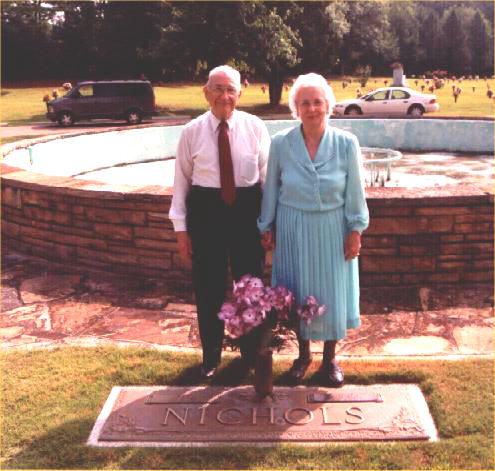
Flavil & Mary Nichols - July 5, 2001
Mary Nichols passed away January 15, 2004
Mary E. Nichols
March 7, 1919
January 15, 2004
Daughter-In-Law of Gus & Matilda
Matilda
March 29, 1894
Oct. 6, 1991
Gus
Jan. 12, 1892
Nov. 16, 1975
![]()
Powerpoint By Scott Harp, Presented At Heritage University - September 21, 2010
Gus Nichols' Position Concerning The Holy Spirit - Faulkner Lectures - 2017 - by Scott Harp
Synopsis of Lectures on the Holy Spirit by Gus Nichols - by Scott Harp
![]()
